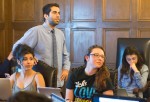Undergraduate student government officials held a town hall meeting Monday to talk with students about potential bylaws amendments that would affect councilmember stipend increases, resolution reform and the appointment review process.
About 25 students, including Undergraduate Students Association Council members and office staff members, attended the meeting to discuss possible ways to increase student input in USAC procedures and improve efficiency. The USAC Internal Vice President’s Office hosted the town hall meeting.
The event was prompted partially by student response to councilmembers’ decision to increase their stipends over the summer and concerns about the level of student input involved in the drafting of USAC resolutions.
Last week, board members of Bruin Alliance, which ran two candidates unsuccessfully in the spring elections, presented an open letter to USAC that asserted the stipend increase constituted a conflict of interest. At least 16 student groups signed the letter.
At the town hall, Nicole Fossier, board member for Bruin Alliance and an Internal Vice President’s Office student group liaison, suggested that USAC pass a bylaw amendment to prevent stipend increases from going into effect during councilmembers’ elected terms. If the proposed amendment passes, stipend increases would be implemented the following school year.
Avinoam Baral, Internal Vice President’s Office chief of staff, said USAC could include student input in the stipend increase decision by putting a referendum on next year’s spring elections ballot regarding the stipend change.
A referendum, which requires two-thirds of the students’ votes to pass, would implement an amendment to the USAC constitution.
In response to Baral, Lizzy Naameh, a USAC general representative, said she did not support putting the stipend increase to the student body’s vote. Naameh said she thinks a referendum about the stipend increase would affect the USAC elections in the spring, since USAC candidates could campaign for the referendum.
She added that she thinks campaigning for a stipend increase referendum could be unpopular.
USAC members also discussed the importance of gathering more student input in resolutions and implementing earlier deadlines by which councilmembers must announce the content of their resolutions.
Fabienne Roth, a staff development director in the General Representative 1 office, said she thinks students are not well-informed about proposed USAC resolutions because they are publicized for too short a time. Roth said she thinks USAC should set a time frame of a minimum of 10 days in which resolutions must be publicized before they are put to a vote.
Some students at the town hall voiced concerns about such time frames preventing USAC from passing more urgent resolutions, which the council might feel the need to pass quickly if students felt threatened on campus by a hate crime or a similar incident.
Patty Zimmerman, student government services manager, proposed that councilmembers announce the purpose of resolutions at their meetings one week before they vote.
USAC president John Joanino said he thinks USAC could try to remove slate politics from the resolutions process by making councilmembers less associated with specific resolutions.
A resolution must be sponsored by three councilmembers for it to be put to a vote during a USAC meeting, according to USAC bylaws.
“By having people’s names attached to them, (the resolutions) become political,” Joanino said.
Students also discussed ways to make the appointments review process more transparent and efficient.
USAC is tasked with appointing students to about 70 positions on various campus committees, such as the Student Fee Advisory Committee and the Associated Students UCLA Board of Directors.
One of the main concerns raised by students was a lack of accountability for appointed members of USAC.
Joanino said he thinks it is important for councilmembers to maintain communication with appointments and ensure they stay committed to their jobs, since some appointed positions could be perceived as less interesting than others.
Allyson Bach, executive director of academic appointments in the Academic Affairs Commission, said applicants often come into their jobs not fully aware of their responsibilities. Bach said she thinks the applications should be due earlier so that students have more time to become familiar with their job expectations.
Avi Oved, USAC internal vice president, said his office will share the concerns raised at the town hall with other councilmembers at the USAC meeting Tuesday.
Oved added that he plans to take the recommendations into consideration when drafting a bylaw amendment that prevents future councils from raising their own stipends.

I’m confused. There were only USAC members there? This is a complete fail of the IVP office…
Isn’t one of the roles to outreach to student groups? What a fail….
Also, why is a Bruin Alliance, a slate party, member, running to the USAC Town Hall? That’s seems like a major problem…….
Just a quick response:
No, the event was actually publicised and open to ANY student that wanted to come, but the people who showed up were mostly all USAC. This was very last minute and so the outreach was not as broad as we would have liked.
That being said, this was a very productive town hall with members of ALL slates discussing issues and coming to positive conclusions together. Nicole was not the only facilitating the discussion, others were too depending on the topics/ issues they wanted mentioned.
This is the first town hall of a series, and we’d love for you to come to the next one and share your opinions etc. and the IVP office will be sure to try and further publicise this event, but I’m sure you’ll agree it’s hard to get people interested at times.
The outreach was not done well. I personally did not find out about this so called town hall meeting until like an hour before it was suppose to start. An issue with this much controversy and issues needs to be publicized more then it was. This was a complete failure of the people who put on the town hall meeting and were suppose to advertise this meeting.